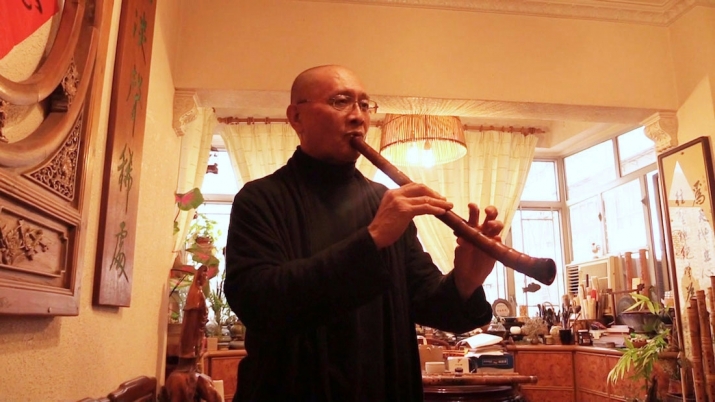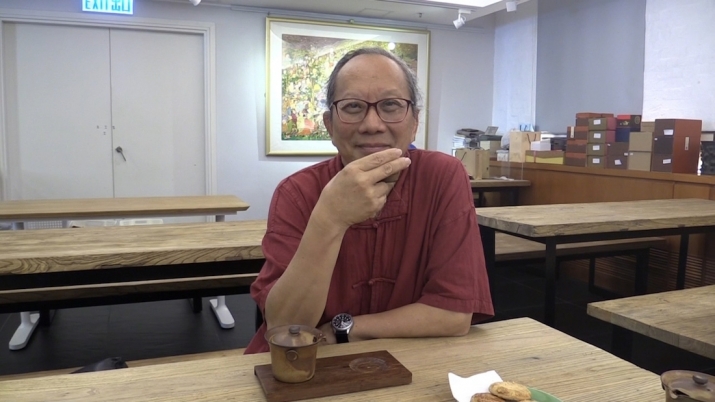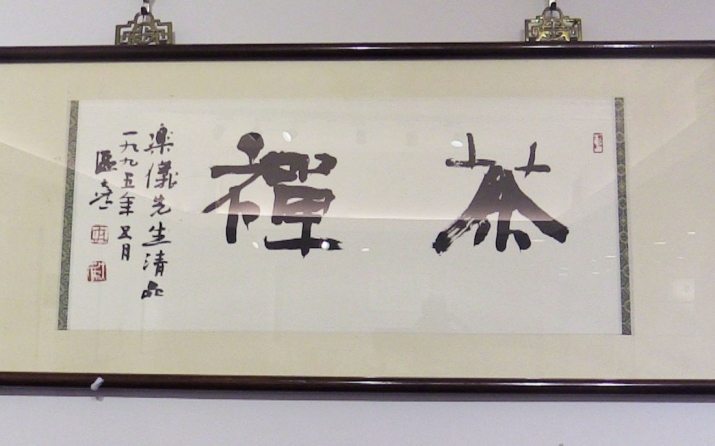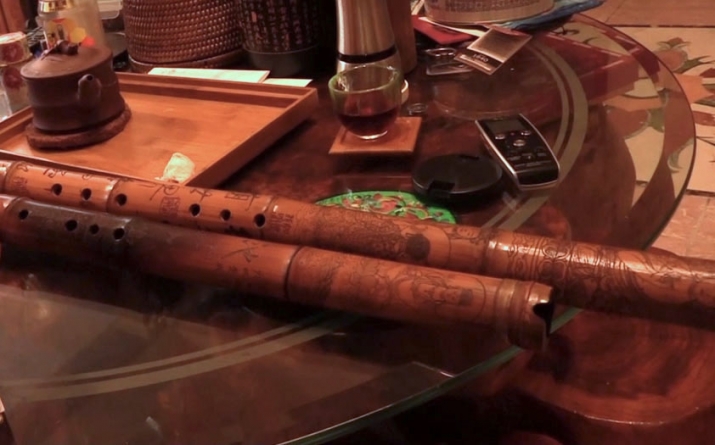FEATURES|THEMES|People and Personalities
Tam Po Shek and Wing Chi Ip: Refreshing the Soul and the Senses by Playing the Flute and Drinking Tea
 Flute Master Tam Po Shek treats his flutes as his spiritual teachers. Image courtesy of the author
Flute Master Tam Po Shek treats his flutes as his spiritual teachers. Image courtesy of the authorWhile our senses may have become dulled by city life, two masters, Tam Po Shek and Wing Chi Ip, teach us that we can find refreshment and peace through the sound of the flute and the drinking of tea.
Flute master Tam Po Shek and tea master Wing Chi Ip (the owner of LockCha Tea House in Hong Kong) both have a profound knowledge of Buddhism in relation to traditional Chinese culture. Close friends, they regular join together to purify the senses of taste and sound with their respective arts. All too often, modern people attempt to attain happiness through the pursuit of material satisfaction, but Tam and Ip advocate simplicity, curtailing the greedy desires that lead to a muddled mind—the source of our confused inner worlds.
 Tea master Wing Chi Ip has been immersed in tea culture for more than 30 years. Image courtesy of the author
Tea master Wing Chi Ip has been immersed in tea culture for more than 30 years. Image courtesy of the authorA peaceful inner world
Following the Buddhist teachings for more than 30 years, Tam’s spiritual growth has not only made him a better person, but has also led to musical success. His music has been used as the soundtrack for countless movies, TV dramas, advertisements, and stage performances over several decades.
“The most touching music is the simplest; it connects with the heart of the audience,” he observes. “The bamboo flute is basically the simplest musical instrument in the world. There are only a few holes on the pipe. Thus, it easily reflects the state of mind of the performer. If the performer has a tumultuous mind, his music can’t deliver a positive feeling to the listener. I consistently work on myself to purify my mind. If my mind is clear and my heart is sincere, my music will resonate with people, helping to put them in touch with their souls.”
Chinese tea master Ip has been immersed in tea culture for more than 30 years. He is also a university professor. He points out that to truly appreciate the pleasure of drinking tea, a peaceful and still mind is required.
“Less is more, no matter the taste of the tea, or the state of mind,” Ip explains. “There is a story about tea from the early Qing dynasty [1644–1912]. Longjing tea sprang up, replacing the popularity of Chinese Usnea tea. People liked the subtle taste of Longjing, which was very different from the much more flavorful and rich Usnea tea. The plain taste of Longjing tea has the capacity to reflect the taste interpretations of the tea drinker. Essentially, everyone’s perception of flavor is different, even with the same cup of tea. Our mind creates our world, as well as the tastes perceived by our tongue. Through the act of drinking tea, we can slow down our inner motion. The mind becomes calm and we can refocus on our true nature. Then the state of Zen is reached.”
Tam and Ip both emphasize that our state of mind affects our world. If our mind is undisturbed, we can see a change in the underlying nature of our world and appreciate every moment of it.
 Chinese calligraphy for "the Zen of tea," which hangs on the wall of LockCha Tea House. Image courtesy of the author
Chinese calligraphy for "the Zen of tea," which hangs on the wall of LockCha Tea House. Image courtesy of the authorLife with flute playing and tea
Tam fashions his own flutes from bamboo. After selecting a piece of bamboo, crafting it into a flute, and then painting on sutras and bodhisattva images, it becomes more than just a musical instrument. It becomes a spiritual masterpiece. “Not all bamboo pipes can be shaped into flutes. It is a kind of luck to find the right piece of bamboo and to transform it,” he notes. “They have followed me through life and taken on different roles. When I was young, they were just musical instruments. When I entered middle age, they were my friends, accompanying me to work and traveling around the world. Now that I am elderly, they are my teachers, reminding me to continue cultivating myself, and purifying my mind.”
Tam treats his flutes as spirits in the form of musical instruments. One of his bamboo flutes, given to him by a farmer, has a fire burn on the outer surface. He painted an image of Guanyin sprinkling water on the burn, as if to release its pain. The spiritual message from Tam’s flutes is one of compassion, which he wants to send to the three planes of existence (trailokya). “A monk once told me that my music, besides being listened to by humans, might reach all kinds of existences in trailokya,” he said. “I want to give the best to all of them. That’s why I craft and paint sutras and bodhisattva images on my flutes—hopefully delivering blessings while my music is playing.”
 Tam painted an image of Guanyin sprinkling water on the flute with a burn mark on the surface, as if to release its pain. Image courtesy of the author
Tam painted an image of Guanyin sprinkling water on the flute with a burn mark on the surface, as if to release its pain. Image courtesy of the authorAccording to the teachings of Buddhism, there is no such thing as form. A piece of bamboo can be transformed into a flute, and even play the role of a spiritual teacher to a musician. With tea, the transformation of form from roasted leaves, pulverized into a powder and blended with hot water into a cup, can help us to understand the changing nature of life.
“In Chinese culture and history, tea has played various roles to different people,” Ip explains. “For farmers, tea is an ordinary beverage. For monks, tea is a meditation tool. For aristocrats, tea is a banqueting beverage served to guests. When we drink tea, its taste is unreal, because everyone perceives a different flavor. However, the act of drinking tea is real. The real and unreal feeling experienced during the process of drinking tea can be applied to life itself. All compounded phenomena in life, like tea, have no intrinsic form, and flowing between the real and unreal, are impermanent.”
Distress in life is rooted in our minds, so cleansing our mind is essential, he concludes. “Enlightenment cannot be reached by looking outside. It only happens when our mind is purged.”
Tam and Ip refresh people’s minds and souls through tea and music. When our mind is still, inspiration for living can come from anywhere.














